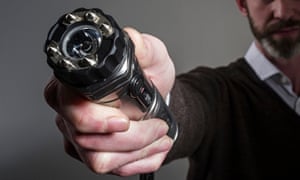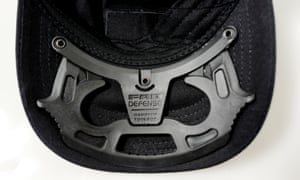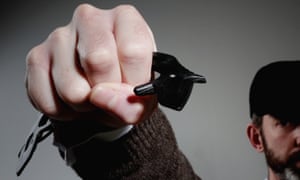Banned and dangerous weapons, many of them disguised as everyday items, are being routinely and illegally sold to online shoppers on Amazon.co.uk, a Guardian investigation has found.
Illegal weapons, including some reputedly developed for military and police forces, have been put up for sale in breach of UK firearms and offensive weapons laws.
In test purchases, the Guardian bought three weapons on Amazon.co.uk: a pistol that fires a jet of high-strength pepper spray at 112mph; a 1m-volt stun gun disguised as a torch; and a baseball cap containing a hidden stabbing knuckleduster in its peak. The sale of all three is illegal.
A spokesperson from the National Crime Agency said such items “aren’t harmless souvenirs or toys – they are dangerous weapons capable of causing serious harm and facilitating further crime.
“Importing them isn’t worth the risk when you consider that you can spend five years in prison.”
The stun gun and cap were dispatched to the Guardian by independent Amazon sellers in the US and Israel respectively. On customs paperwork the packages were declared as an “LED flashlight” and a “toy part”. The cap was wrongly marked as an imported gift, while the value of the stun gun was given as $9.99, rather than the £99.95 paid by the Guardian.

The pepper spray pistol was sold directly by Amazon and couriered promptly from its warehouse outside Milton Keynes, where the company has held the product line at least intermittently for 14 months, making sales and replenishing stock levels.
The Guardian has learned that police in Scotland are already investigating an Amazon sale of the same pistol model to a customer in Edinburgh in October last year.
Even though the online retailer’s legal department was aware of the investigation, Amazon.co.uk continued to advertise, sell, and top up stock in its UK warehouse. The Guardian was able to buy the pistol with ease, receiving it within 48 hours of ordering.
The stun gun was bought just days after the high-profile conviction of Nathan Matthews and his girlfriend, Shauna Hoare, for the murder of his step-sister, Becky Watts. At trial the jury heard how Matthews had bought two stun guns, also disguised as torches, on the internet for £18 using his mobile phone. The weapons had estimated voltages of 8,230 volts and 8,450 volts.
Matthews told the court he had not known they were illegal. He explained he had intended to use them on Watts until she passed out as part of a kidnap attempt – an attempt that was botched, ending in her death.
The Guardian was able to buy a stun gun on Amazon.co.uk similar in appearance to the one purchased by Matthews. It was sold by a US seller company in St Charles, Missouri, and in one email exchange about delivery times the firm volunteered: “We are technically not supposed to sell these in the UK.” The weapon was sent anyway.
The cap containing the concealed stabbing weapon was jointly designed by the Israeli martial arts expert, Yaron Hanover, and FAB Defense, a firm that claims to make “tactical equipment” for the Israel military and police.
The cap is not dissimilar to those reputedly used by a 19th-century Birmingham crime gang, which stitched razor blades into the peaks of their cloth caps. The gang, known as the Peaky Blinders, were the inspiration behind a BBC2 television drama of the same name.

Despite the sale of dangerous weapons by Amazon and other sellers using its UK site, official literature from the company stipulates: “Products sold on theAmazon.co.uk site must comply with all applicable laws … Items classified as weapons under UK legislation including the Firearms Act 1968 and the Offensive Weapons Act 1996 are prohibited.”
Amazon provides sellers with a list of 42 banned weapons: grenades, nunchuks, butterfly knives, brass knuckles and more. Also on the list are pepper spray, stun guns and weapons designed to be concealed or disguised.
But the Guardian has found a large number of items, clearly capable of doubling as weapons, advertised for sale on Amazon.co.uk. They include:
• Knuckleduster gloves containing lead shot.
• A “lady pink” miniature pepper spray aerosol on a key ring.
• A keychain that doubles as a martial arts weapon known as a monkey fist or kusari.
• A “3m volt” stun gun disguised in lipstick casing.
The Guardian sent details of these and its sample weapon purchases to Amazon, which removed all items from sale immediately.
The three items were handed over to two Metropolitan police officers on Wednesday afternoon, shortly after the Guardian’s story was published online.
In a statement, Amazon said: “All [Amazon] sellers must follow our selling guidelines and those who don’t will be subject to action including potential removal of their account. The products in question are no longer available.” Amazon declined to comment on the fact it is the seller of Guardian Angel II pepper pistols.
The Amazon haul
Pepper pistol
The Guardian Angel II is advertised for sale on Amazon.co.uk as a “handy animal deterrent model gun”, priced at £36.73, dispatched and sold by Amazon itself. The gun is blue with a red trigger and has two cylinders filled with high-strength pepper solution, each propelling the liquid at 112mph. Raphael Fleischhauer, the engineer who co-founded Piexon, the Swiss company which manufactures the gun, in 1999, has likened being hit to “getting slashed in the face”.
Gotcha Cap
The cap’s brim conceals a stabbing device designed to be held in the manner of a knuckleduster. It is listed on Amazon.co.uk, priced £29.45, as a “low-profile, less-lethal self-defense tool”. Nowhere on the site is it described as a weapon, though online shoppers are told it will “insure that you will never be caught empty handed”. The cap contains a concealed stabbing and slicing device that can be quickly detached from the peak and be held in a clenched fist like a knuckleduster.
Stun gun torch
The Zap Light sends one million volts between six metal prongs at the front of its torch. It looks like a regular torch and is advertised on Amazon.co.uk as a “self-defence flashlight”, but flick a switch and the Guard Dog Security Diablo transforms into a powerful stun gun. The words “stun gun”, perhaps deliberately, are not spelt out. “Protect yourself with this 1m volt ‘light’ with added voltage to defend yourself against any attacker”, reads the product description.
A Home Office spokesperson said selling such weapons was against the law: “It is an offence to sell any prohibited firearms – including stun guns – and we are increasing the maximum prison sentence for this offence from 10 years to life in prison.
“Nor should anyone intending to carry these weapons in the UK be in any doubt of their illegality. Anyone caught in possession of a weapon banned in the UK faces being charged with illegal importation of a prohibited weapon, which can lead to a prison sentence.
The Home Office added: “The government is taking action with both online and high street retailers to reduce the availability of knives and other prohibited weapons as part of our forthcoming modern crime prevention strategy.”
Pepper spray has often been used in unprovoked attacks or robberies and is illegal in the UK under the Firearms Act. Last year, a 21-year-old man was sprayed and beaten by a man on a bus in Birmingham after asking the attacker to stop his children throwing sweets at him.

In 2008, BBC2’s Watchdog investigated illegal pepper spray products sold by independent traders on Amazon.co.uk. The retailer’s then UK managing director, Brian McBride, told the programme he took dangerous and illegal weapons very seriously, that such listings would not be tolerated, and that any offending items identified would be “removed within the hour”.
Since then pepper spray and other dangerous and illegal weapons have reappeared on Amazon.co.uk.
In 2011, the company ended a close working relationship it had built up with itsprimary trading standards authority in Slough.
Many nationwide retailers, from eBay to Tesco, choose to keep in regular contact with a “primary authority” in order to make it easier to comply with trading standards laws and improve intelligence about regulatory matters. Amazon does not.
[Source:-The Gurdian]
